随着PTE考生对PTE口语和PTE听力的重视,大家口语和听力的分数得到极大提高,但是PTE阅读渐渐成为考生们新的难题。墨尔本悉尼文波PTE特别为PTE考生们挑选了适合练习PTE阅读的文章,主题,内容,长度都与PTE阅读题中的文章相似。激活学过的词汇,更新新的词汇,提高阅读速度,全面提升自己的阅读能力。
A series of popular science articles have recently been touting the health benefits of tattoos, specifically their ability to boost your immune system. Most are based on a studyled by Dr. Christopher Lynn at the University of Alabama. But is a little ink really the cure for the common cold?
The answer is, as is often the case, not as simple as many of these headlines might suggest. The study focused on a group of 29 people visiting a tattoo parlor in Alabama for a new tattoo. The researchers tested both the levels of cortisol—an indicator of our body’s stress response—and Immunoglobin A (an antibody that helps our body fight infections, called IgA for short) in each person before and after getting their new body art. In addition to monitoring our body’s response to stressful situations, cortisol also is known to act as an immunosuppressant, i.e. an inhibitor to our body’s natural defenses. The tests were meant to quantify any changes in the body’s immune system functions before and after getting a tattoo.
The study revealed that those with no pre-existing tattoos experienced a greater strain on their immune system (a larger dip in their IgA levels) possibly due to greater feelings of stress. Those on their second, third (or twelfth) tattoo instead experienced a surge in their IgA immediately following their inking session. Their bodies appeared to be less stressed by the experience having gone through the process at least once before. The researchers titled the paper releasing their result “Tattooing to Toughen Up.”
Toot: v. 吹捧,赞扬。
Studyled: n. 研究。
Cortisol: n. [生化] 皮质醇。
Immunoglobin: [生化] 免疫球蛋白。
Immunosuppressant: [免疫] 免疫抑制剂。
墨尔本悉尼文波PTE原创首发
更多精彩请持续关注微信wenbo_tv2。





